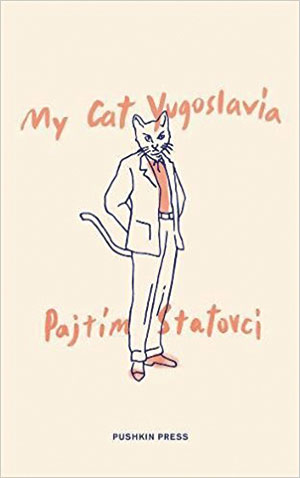Despite the imagination-sparking opportunities offered by images of desolate fishermen waving Nokias under gunmetal skies, the sparsely populated long-winter country of Finland does not enjoy a notable literary reputation. But Pajtim Statovci’s debut novel My Cat Yugoslavia is such a beguiling, intelligent and tender thing, it might win the nation another place at Europe’s top cultural table, at which post-war Moomins creator Tove Jansson is still Finland’s sole breakthrough writer.

Don’t be misled by an opening chapter comprising a loveless late-night hook-up arranged via a less than dewy-eyed dating app (‘porcelain cheeks need stiff cock’); My Cat Yugoslavia is a masterclass in defining the soft spots which mark human vulnerability.
Emine is a Kosovan Muslim, married off at 17 to an attractive man whose confidence is ‘like a wave the size of an entire building,’ but turns out to be a paranoid bully. When the Balkans war breaks out the family flee to Finland where they are grudgingly tolerated as unwanted refugees from a dangerous, uncivilised nation.
Though magic realism suggests fantasy and dream, the real subjects here are fear, disappointment, and shame, and the bruised heart bashed around them
Years later, one of Emine’s sons, Bakim, has become a lonely, anxious man, his homosexuality having further
cemented his outsider status. His deepest relationship is with his pet boa constrictor, whose squeezes he chooses to interpret as hugs. But when he brings home a charismatic talking cat – whose cutting wit and gleeful sadism remind one in turn of Oscar Wilde, Kanye West and Ramush Haradinaj – his life curveballs significantly. (Their meeting in a gay bar is worth reading alone, a brilliantly written combination of absurd humour and awesome revelation).
Though the magic realism (and nod to Russian author Mikhail Bulgakov) suggests fantasy and dream, the real subjects here are fear, disappointment, and shame, and the bruised heart bashed around them. Statovci himself left Kosovo for Finland as an infant, and he investigates the iniquities and imposed hierarchies of Emine’s homeland with authority and empathy.
Much of Statovci’s focus is on the illusions and false premises which create a social and familial order built entirely on widely accepted lies. Casualties of a violent world divided by race, gender and sexuality, Emine and Bakim spend long years negotiating the chasm between eager anticipation and cruel, unjust reality. It takes, Statovci suggests, a long period of looking at something over and over, with an open heart and a determined faith, before you can see it for what it is. Only then do love and happiness have a chance of overcoming suffering and betrayal.









